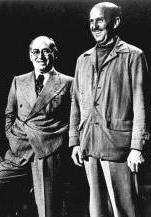The Daily Dodge
From The Wall Street JournalAh, satire! Or perhaps “satire.” Either way — with a single dose of irony or a double — it’s back. What the show “That Was the Week That Was” was to the Sixties, “The Daily Show” on Comedy Central is to the Aughties.
But there is a difference. The consumers of TV satire 40 years ago were assumed by the satirists to be pretty well-informed people already. Now there are indications that a lot of people, especially young people, are skipping the regular news and going straight to the satire.
According to a survey by the Pew Research Center for the People and the Press earlier this year, 21 per cent of people aged 18-29 “regularly” got news about the election campaign from “The Daily Show” or the monologues of late-night comedians — about the same number as watched network news shows or got news from the Internet.
If this is true, it could explain a lot about the way that Jon Stewart, “The Daily Show’s” mock anchorman, chooses to handle his subject. He offers a combination of real stories from the “wacky” end of the news spectrum — like the one about the Iraqi tourism minister whose job is to prevent tourists from coming to Iraq — and mockery of mainstream news sources, especially the pomposity of the network anchors and correspondents. And of course it isn’t just the media that are mocked: It is also conservatives, Republicans, the Religious Right and, most of all, President Bush and his administration.
Now he seems to be branching out into a sermonizing mode, if hypocritically. Last week he went on CNN’s “Crossfire” to tell co-hosts Tucker Carlson and Paul Begala that they were “partisan hacks” who were “hurting America.”
A serious charge, you might think. Certainly Mr. Carlson thought so. He might have made something of the muddled thinking that lay behind Mr. Stewart’s charge of partisanship — against a show specifically set up to confront one partisan with another. But instead Mr. Carlson counterattacked, pointing to the softball questions that Mr. Stewart had asked John Kerry during the presidential candidate’s appearance on “The Daily Show.”
“I didn’t realize — and maybe this explains quite a bit,” Mr. Stewart shot back, “that the news organizations look to Comedy Central for their cues on integrity.” He went on to compare what “Crossfire” does to “theater” and “pro wrestling.”
These comments led to more angry words, as each man insulted the other. But the anger generated by the exchange, and the insults that have continued since, only obscure what exactly was going on.
Mr. Stewart used his appearance on “Crossfire” to make a serious point, yet when it was taken up seriously he tried to retreat into his characteristic pose as a harmless comedian. “You are on CNN,” he said to Mr. Carlson when accused of sucking up to Mr. Kerry; “the show that leads into me is puppets making crank phone calls.”
So then we shouldn’t pay any attention to him when he tries to be serious? I don’t think he quite meant to say that, and yet he is saying it, in effect, all the time. Under the cover of humor, his show routinely makes vicious points about, say, the Iraq war. Are we meant to think of the puppets when we hear such “Daily Show” bits or when Mr. Stewart endorses Mr. Kerry for president?
It’s a convenient double game. Mr. Stewart owes his success in no small measure to his irreverence toward the sanctimony with which the regular or “real” TV news conducts its business, yet there he is attacking one of the few news shows on television that has no room for the network “anchor” and his po-faced self- importance. Certainly Mr. Stewart’s criticism of “Crossfire” for its resemblance to pro-wrestling is odd coming from an avowed entertainer like himself. Could it be that he wants to corner the market in turning politics into entertainment?
Perhaps, but maybe it isn’t satirical competitors that Mr. Stewart fears from “Crossfire” so much as the threat it poses to the pomposity of his satirical subjects. That, after all, is Mr. Stewart’s bread and butter. More than anyone since Stan Freberg, whose radio skits about American history were also popular in the 1960s, Mr. Stewart has made his media fortune out of deflating the dignity of America’s politicians and statesmen, dead as well as alive.
Weighing in at No. 1 on the New York Times bestseller list last week, for example, was his America (The Book) — a mock civics textbook complete with an authentic-looking school-board stamp inside the front cover and a cover-line proclaiming: “With a Foreword by Thomas Jefferson.”
Those familiar with the Stewart technique won’t be surprised to learn that in this foreword the third president shows his familiarity with the language of the 21st-century streets and recounts the doubts of a certain “Sally” about his taking on such work: “You are the author of the Declaration of Independence. A scholar. A statesman. This is beneath you. It’s not even network.” Then he has “T.J.” sign off with a postscript: “Oh, and is it true Halle Berry is once again single?”
If the only thing he knows about Jefferson besides his authorship of the Declaration is the allegation of his sexual liaison with his slave Sally Hemmings, it doesn’t bother Jon Stewart — or his audience. Just as you don’t have to know the news to watch “The Daily Show,” you don’t have to know anything, really, about American history or government to enjoy America (The Book).
The mockery of Stan Freberg Presents the United States of America was affectionate and depended on the sort of knowledge about American history that could then have been taken for granted. Mr. Stewart sounds in his book as he does on his TV show — not affectionate but arrogant, as if he were way too cool to bother finding out the facts of the real history, or news, that he’s sending up. Who can take such stuff seriously?
Make no mistake: Mr. Stewart can be funny. His mock Larry King interview with Adolf Hitler in his earlier book, Naked Pictures of Famous People (1998), was hilarious, but it also made a serious point about how the media can be manipulated with the jargon of the therapeutic culture.
Lately when things have turned serious for a moment, Mr. Stewart has beaten a hasty retreat, as he did on “Crossfire.” Comedy without an underlying moral seriousness is a species of nihilism, as fatiguing as the Olympian posturings of the network news. Someone should tell Jon Stewart that partisan hacks are what made this country great. But he probably doesn’t care.
Discover more from James Bowman
Subscribe to get the latest posts to your email.







